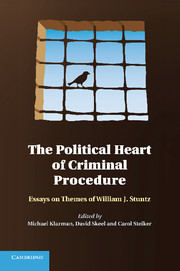Book contents
- Frontmatter
- Contents
- Contributor List
- Introduction: Appreciating Bill Stuntz
- Part I The Political Economy of Substantive Criminal Law
- Part II Police Investigations
- Part III Emotion, Discretion, and the Judicial Role
- 9 Two Conceptions of Two Conceptions of Emotion in Criminal Law: An Essay Inspired by Bill Stuntz
- 10 Patrolling the Fenceline: How the Court Only Sometimes Cares about Preserving Its Role in Criminal Cases
- 11 Three Puzzles in the Work of Bill Stuntz
- 12 The Mercy Seat: Discretion, Justice, and Mercy in the American Criminal Justice System
- 13 Epilogue: Three Underrated Explanations for the Punitive Turn
- Index
- References
9 - Two Conceptions of Two Conceptions of Emotion in Criminal Law: An Essay Inspired by Bill Stuntz
Published online by Cambridge University Press: 05 March 2012
- Frontmatter
- Contents
- Contributor List
- Introduction: Appreciating Bill Stuntz
- Part I The Political Economy of Substantive Criminal Law
- Part II Police Investigations
- Part III Emotion, Discretion, and the Judicial Role
- 9 Two Conceptions of Two Conceptions of Emotion in Criminal Law: An Essay Inspired by Bill Stuntz
- 10 Patrolling the Fenceline: How the Court Only Sometimes Cares about Preserving Its Role in Criminal Cases
- 11 Three Puzzles in the Work of Bill Stuntz
- 12 The Mercy Seat: Discretion, Justice, and Mercy in the American Criminal Justice System
- 13 Epilogue: Three Underrated Explanations for the Punitive Turn
- Index
- References
Summary
1.
My goal in this essay is to reexamine a solution to an important puzzle about the significance of emotions in substantive criminal law. Indeed, the reexamination is in the nature of a qualification bordering on confession of error. The position I want to question was forged in the course of a sustained, multifaceted, and very satisfying scholarly conversation in which I myself played a part. But now, as a result of my participation in another set of scholarly conversations – ones that had until recently struck me as entirely collateral to emotions and criminal law – I find myself compelled to call attention to what I regard as the likely inadequacy of an account I had a significant hand in promoting.
I am not disheartened, though, to find myself in this position. There is, to be sure, discomfort in admitting doubt about arguments that had once struck me as both compelling and complete. Yet there is an even bigger reward: the discovery of continuing vitality in a problem that once filled me, and now does again, with intellectual energy. Other scholars, too, might find it awkward for me to express misgivings at this point about claims that built on and were extended by their work. But I feel confident that they, rather than resenting my second thoughts, are likely to welcome them for supplying an occasion to test whether conclusions they once formed continue to warrant their considered assent.
- Type
- Chapter
- Information
- The Political Heart of Criminal ProcedureEssays on Themes of William J. Stuntz, pp. 163 - 176Publisher: Cambridge University PressPrint publication year: 2011

